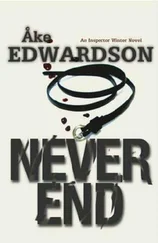The officer shrugged her shoulders.
“She hasn’t said anything about it herself,” she said.
“But the neighbors?”
“One of them says that she’s seen him.”
“And no children?” asked Aneta. “They don’t have any children?”
“No.”
“We’ll have to look him up.” That bastard, she thought.
“That bastard…,” she mumbled.
“What did you say?”
“The man,” said Aneta, and she could feel that she was smiling when she turned toward the young officer again.
It was evening when Aneta opened the door to the house and smelled the familiar odor in the stairwell. Her house, or her apartment building, to be exact, or even more exactly: the building she lived in. But it felt like her own house. She enjoyed living in this old patrician house on Sveagatan. It was centrally located. She could walk to almost anything. She could choose not to walk. And change her mind again.
The elevator lugged itself up. She liked that too. She liked opening the door and picking up the mail from the wooden floor. She liked dropping her coat where she stood, kicking off her shoes, seeing the big old shell that she’d always kept on a bureau, seeing the African mask that hung over it, walking in her socks to the kitchen, heating the water in the kettle, making tea, or sometimes having a beer, sometimes a glass of wine. Liked it.
She liked the solitude.
Sometimes she was afraid because she felt this way.
You shouldn’t be alone. That’s what others thought. There’s something wrong when you’re alone. No one chooses solitude. Solitude is a punishment. A sentence.
No. She wasn’t serving any sentence. She liked sitting here and deciding to do whatever she wanted whenever she wanted.
She was sitting on a kitchen stool now, of her own free will; the kettle worked itself up to a climax. She was just about to get up to make tea when the telephone rang.
“Yes?”
“What are you doing?”
The question was asked by Fredrik Halders, a colleague, an intense colleague. Not as much anymore, but still really very intense compared to almost everyone else.
Two years ago he had lost his ex-wife when she was hit and killed by a drunk driver.
She’s not even still here as an ex, Halders had said for a while afterward, as though he were only half conscious.
They had been working together when it happened, she and Fredrik, and they started seeing each other. She had gotten to know his children. Hannes and Magda. They had begun to accept her presence in their home, truly accept it.
She liked Fredrik, his character. Their preliminary banter had developed into something else.
She was also afraid of all this. Where would it lead? Did she want to know? Did she dare not to try to find out?
She heard Fredrik’s voice on the phone:
“What are you doing?”
“Nothing. Just got in the door.”
“You don’t feel like a movie tonight, do you?” Before she could answer he continued: “Larrinder’s daughter wants to earn some extra money babysitting. She called me herself. He asked me today and I told him to have her call.” Bo Larrinder was a relatively new colleague in the criminal investigation department. “And she called right away!”
“A new world is opening for you, Fredrik.”
“It is, isn’t it? And it leads to Svea.”
The Svea cinema. A hundred yards away. She looked at her feet. They looked flattened, as though they had been pressed under an iron. She saw her teacup waiting on the kitchen counter. In her mind’s eye she saw her bed and a book. She saw herself falling asleep, probably soon.
“Fredrik. I’m not up to it tonight. I’m exhausted.”
“It’s the last chance,” he said.
“Tonight? Is tonight the last showing?”
“Yes.”
“You’re lying.”
“Yes.”
“Tomorrow night. Bien. I’m already mentally preparing myself so it will work to go out tomorrow.”
“Okay.”
“It’s okay, right?”
“Of course it’s okay. What the fu-What do you think? What were you doing this afternoon, by the way?”
“Possible wife beater in Kortedala.”
“They’re the worst. Did you get him?”
“No.”
“No report?”
“Not from the wife. Not from the neighbor, either, it turned out. But it was the fifth time.”
“How does she look?” Halders asked. “Is it really bad?”
“You mean injuries? I haven’t met her. I tried.”
“I guess you’ll have to go in, then.”
“I thought about it as I was driving away. I went back and forth about it.”
“Do you want company?”
“Yes.”
“Tomorrow?” said Halders.
“No time tomorrow. I have those café burglaries in Högsbo.”
“Say the word and I’m ready.”
“Thanks, Fredrik.”
“Now get some good rest and mentally prepare yourself for tomorrow, babe.”
“ Bonsoir, Fredrik.”
She hung up the phone with a smile. She made tea. She went into the living room and put on a CD. She sat on the sofa and felt her feet begin to recover their shape. She listened to Ali Farka Touré’s blown-apart desert blues and thought about a country south of Touré’s Mali deserts.
She got up and changed the CD, to Burkina Faso’s own great musician Gabin Dabiré: his Kontômé from 1998. Her music. Her country. Not like the country she had been born in and lived in. But her country.
Kontômé was the idol found in every Burkinian home. She had hers in the hall, above the bureau. The icon represented the spirits of the ancestors, who were the guiding light for the family and for the entire society.
The light, she thought. Kontômé lights the path. We thank Kontômé for what we are and what we have, now and in the future. And Kontômé helps us when fate unfolds on that path.
Yes. She believed in it. It was in her blood. That was as it should be.
Aneta Djanali had been born at Östra Hospital in Gothenburg to parents from Upper Volta. The country’s name had changed to Burkina Faso in 1984, but it was still the same impoverished country, filled with wind, like the music she listened to, steppes that became deserts, water that didn’t exist.
It was a vulnerable country.
Dry Volta. Impoverished Volta. Sick Volta. Violent Volta. Dangerous Volta.
Her parents came to Sweden in the sixties, a few years after the country’s independence, fleeing persecution.
Her father had been in prison for a short time. He could just as easily have been executed. Just as easily. Sometimes it was only a question of luck.
The former French colony inherited terror and murderers from the Frenchmen who had murdered there since the end of the nineteenth century. Now the Frenchmen were gone, but their language remained. The people were African but out of their mouths came words in French, the official language.
She had learned French as a child, in Gothenburg. She was the only child in the Djanali family. When she wasn’t little anymore, when she had been with the police for a long time, her parents chose to return to their hometown, Ouagadougou, the capital.
For Aneta, it was an obvious choice to stay in the country she was born in, and she understood why Mother and Father wanted to return to the country they were born in, before it was too late.
It was almost too late. Her mother had come back with two months to spare. She had been buried in the hard, burned red earth at the northern fringes of the city. During the funeral, Aneta had watched the desert press in from all directions, millions of square miles in size. She had thought about how there were sixteen million people living in this desolate country, and how that wasn’t so many more than in desolate Sweden. Here they were black, incredibly black. Their clothes were white, incredibly white.
Читать дальше












